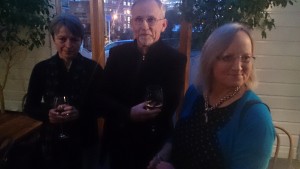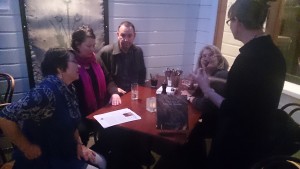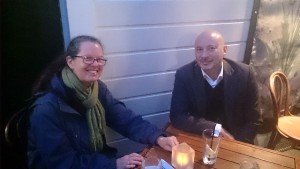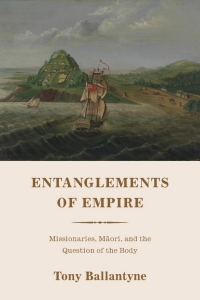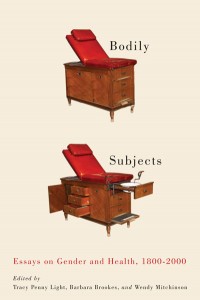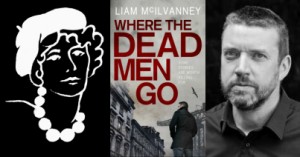New Publication on Indigenous Mobilities
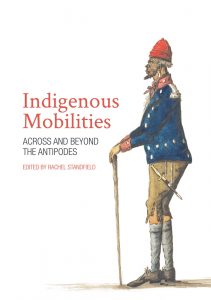 In November 2014, CROCC co-hosted the Indigenous Mobilities symposium at Otākou Marae. This event attracted a number of Australian historians as well as some CROCC scholars, looking at Māori and Aboriginal mobilities of the past. ANU Press, in conjunction with Aboriginal History, have published this research as Indigenous Mobilities: Across and Beyond the Antipodes. This edited collection can now be downloaded free in PDF or eBook form either in its entirety or as individual essays, including those of CROCC members, Tony Ballantyne, Angela Wanhalla and Lachy Paterson.
In November 2014, CROCC co-hosted the Indigenous Mobilities symposium at Otākou Marae. This event attracted a number of Australian historians as well as some CROCC scholars, looking at Māori and Aboriginal mobilities of the past. ANU Press, in conjunction with Aboriginal History, have published this research as Indigenous Mobilities: Across and Beyond the Antipodes. This edited collection can now be downloaded free in PDF or eBook form either in its entirety or as individual essays, including those of CROCC members, Tony Ballantyne, Angela Wanhalla and Lachy Paterson.
New Book on Religious Childhoods
Creating Religious Childhoods in Anglo-world and British Colonial Contexts, 1800-1950 is a new co-edited collection from Centre member, Hugh Morrison, and Mary Clare Martin (Greenwich University, UK). This new book, published by Routledge, features children and religion in colonial society contexts such as New Zealand, and aims to develop greater understanding of religion as a critical element of modern children’s and young people’s history.
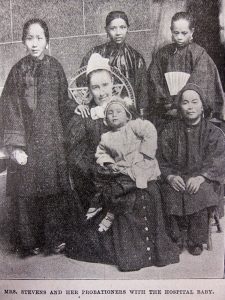
‘Mrs Stevens and her probationers with the hospital baby’, alongside article by Mary Budden, ‘Almora Christian Families’, in LMS Chronicle, July 1895, p. 182 (from Chapter 1, p. 27)
Arguing that religion was an abiding influence (positive, negative and benign) among British-world children throughout the nineteenth century and much of the twentieth, the book places ‘religion’ at the centre of analysis and discussion, while at the same time positioning the religious factor within a broader social and cultural framework. Essays written by an international grouping of scholars focus on a range of geographical settings: America, Australia, Britain, Canada, Fiji, India, New Zealand, South Africa and the South Pacific. The various contexts within which religion shaped childhood in these settings – mission fields, churches, families, communities, institutions, camps, schools and youth movements – are treated as ‘sites’ in which religion contributed to identity formation, albeit in different ways relating to such factors as empire, nation, gender, race, disability and denomination. Chapters on New Zealand include: an examination of southern Dunedin’s religious identity; children’s religious literature published by A.H. & A.W. Reed; and the ways in which religious identity was conflated with civic qualities of sacrifice and service.
Three Centre members finalists for best History book award
Professor Tony Ballantyne, Professor Tom Brooking, and Dr Angela Wanhalla, are three of the the four finalists for the inaugural W.H. Oliver Prize for best book on New Zealand history, to be awarded next week at the New Zealand Historical Association conference. The books are Tony Ballantyne, Entanglements of Empire: Missionaries, Maori, and the Question of the Body (AUP); Tom Brooking, Richard Seddon, King of God’s Own: The Life and Times of New Zealand’s Longest Serving Prime Minister (Penguin); and Angela Wanhalla, Matters of the Heart: A History of Interracial Marriage in New Zealand (AUP).
All three finalists are academics within the Department of History and Art History, but also members of the Centre for Research on Colonial Culture. For the full story, read the latest article in the Otago Bulletin Board.
Wellington celebration
The Centre would like to thank Professor Charlotte Macdonald who organized a celebration for The Lives of Colonial Objects on Monday evening at the Thistle Inn in Wellington.
Folk from the capital (from VUW, Te Papa, and others) are well represented in the book, and it was a great opportunity to come together, along with friends and colleagues. Two of the co-editors, Annabel Cooper and Lachy Paterson, were able to attend from Dunedin. He mihi nunui, Charlotte, for your passion and your hospitality.
New Publications
Congratulations to Tony Ballantyne and Barbara Brookes on the release of their newest books. Tony’s book, Entanglements of Empire, was released by Duke University Press in late December, with a New Zealand imprint published by Auckland University Press being released in April.
In the past week, a collection of essays co-edited by Barbara Brookes with Canadian colleagues Tracy Penny Light and Wendy Mitchinson (both University of Waterloo), Bodily Subjects: Essays on Gender and Health, 1800-2000, was released by McGill-Queen’s University Press. The collection explores the historical entanglement between gender and health across two centuries and in a variety of locations through essays ranging from the nineteenth-century British Poor Laws, an Aboriginal reserve in 20th century Queensland, AIDS activists on the streets of Toronto in the 1990s.
Congratulations Barbara and Tony!
Liam McIlvanney wins Ngaio Marsh Award
Great news about CROCC member, Professor Liam McIlvanney.
Press Release by Craig Sisterson: craigsisterson@hotmail.com
An exceptional thriller entwined with national and workplace politics, sectarian warfare, and the changing face and influence of the newspaper industry has won University of Otago Professor of Scottish Studies Liam McIlvanney the prestigious Ngaio Marsh Award for Best Crime Novel.
Dunedin-based McIlvanney was announced as the winner, for his “fascinating, brilliant, and challenging” novel WHERE THE DEAD MEN GO, before a packed house at the conclusion of the lively Great New Zealand Crime Debate event at the WORD Christchurch Writers & Readers Festival on Saturday 30 August. “In a year where we had our strongest, deepest, and most diverse long list ever, and four truly fantastic finalists, WHERE THE DEAD MEN GO got the nod for its terrific, page-turning storytelling powered by superb prose, fascinating characters, and an evocative sense of place,” said Judging Convenor Craig Sisterson. “It’s the kind of book that lingers in your mind beyond the final page.”
In WHERE THE DEAD MEN GO, Glasgow stands on the precipice: of the Commonwealth Games, a national vote on Scottish independence, and an explosive rekindling of a brutal gangland war. Gerry Conway is a jaded, jobbing journo, the golden child fallen, clinging to the coat-tails of his former protégé, Martin Moir. When Moir’s body is discovered as a big story breaks, Conway steps into his shoes; a very dangerous place, as gangsters, politicians, and other predators swirl around.
The judging panel, consisting of crime fiction experts from New Zealand, Australia, and the United States, called WHERE THE DEAD MEN GO “a thought-provoking novel with very real characters and a fascinating, complex plot”. McIlvanney puts a lot into this book: the state of the news media, what it takes to be a good reporter, politics, family life, and even a New Zealand connection, said one judge. “Excellent writing makes it all fit together very nicely indeed.” Conway was described by the judges as “an unlikely hero perhaps, as the mainstream media around the world are going down the gurgler… he keeps digging away like a real reporter should, even when his bosses are less than supportive.”
The Ngaio Marsh Award for Best Crime Novel, established in 2010, is named for Dame Ngaio Marsh, who is renowned worldwide as one of the four Queens of Crime of the Golden Age of Detective Fiction. Dame Ngaio published 32 novels featuring Inspector Roderick Alleyn between 1934 and her death in 1982. With sales in the millions, and her books still in print to this day, Dame Ngaio is one of New Zealand’s most globally successful authors. Dame Ngaio’s closest living relative, John Dacres-Manning, gave his blessing for the New Zealand crime writing award to be named in her honour, saying that “I know that Dame Ngaio would be so proud… to know that her name is associated with the award”.
In addition to the award itself, McIlvanney, who is the son of famed Scottish novelist and poet William McIlvanney, wins a set of Dame Ngaio’s novels, courtesy of HarperCollins, and a cheque for $1,000 from the Christchurch Writers’ Festival Trust.
Erik Olssen’s Working Lives, National Radio review
Gyles Beckford reviewed Erik Olssen’s Working Lives c. 1900 a photographic essay today on National Radio’s Nine to Noon programme with Kathryn Ryan. They described this as “a great book”. Emeritus Professor Erik Olssen is a treasured member of CROCC. Click here to listen to the review. (Length 4′ 44″.)
New Biography on Richard Seddon
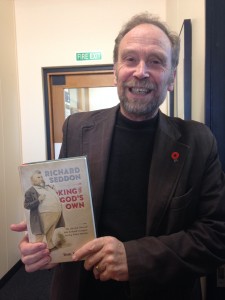 Richard Seddon was a colossal figure in New Zealand politics up to his death in 1906. His Liberal Party was New Zealand’s first modern political party; his government introduced old age pensions and votes for women, as well as an industrial conciliation and arbitration system. Seddon was able, for much of his time as Prime Minister, to gain the support from a wide range of the political spectrum, at the same time that the rest of the world marvelled at the country’s “socialist” experiments.
Richard Seddon was a colossal figure in New Zealand politics up to his death in 1906. His Liberal Party was New Zealand’s first modern political party; his government introduced old age pensions and votes for women, as well as an industrial conciliation and arbitration system. Seddon was able, for much of his time as Prime Minister, to gain the support from a wide range of the political spectrum, at the same time that the rest of the world marvelled at the country’s “socialist” experiments.
It has been almost 60 years since an authoritative biography of Seddon has appeared, R.M. Burdon’s King Dick. Until now! CROCC member, Professor Tom Brooking’s latest book Richard Seddon: King of God’s Own has just been published by Penguin Books, and gives us fresh insights into “the Life and Times of New Zealand’s Longest-serving Prime Minister”. Congratulations, Tom.
Dr Angela Wanhalla wins Ernest Scott Prize
At the Australian Historical Association conference in Brisbane last night, 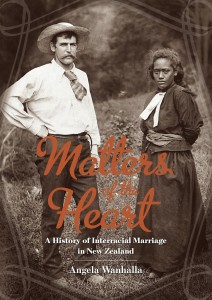 CROCC member Dr Angela Wanhalla was awarded the Ernest Scott Prize for History. This prize is awarded annually to the book judged to be the most distinguished contribution to the History of Australia or New Zealand or to the history of colonization published in the previous year.
CROCC member Dr Angela Wanhalla was awarded the Ernest Scott Prize for History. This prize is awarded annually to the book judged to be the most distinguished contribution to the History of Australia or New Zealand or to the history of colonization published in the previous year.
Matters of the Heart: A History of Interracial Marriage in New Zealand was published by Auckland University Press.
As the judges commented “Angela Wanhalla’s ground breaking history of interracial relationships in New Zealand across two hundred years utilises not only the usual range of church and state records but also personal papers, family and local histories to track the lives of couples whose relationship was sustained over a period of time. While Maori women left little trace for the historian, Wanhalla uses analysis of images, particularly photography, to overcome some of the gaps and silences in the record. She takes a broad view of coupling which incorporates common law relationships, Maori ceremonies and Christian marriages sanctioned by the State and also takes account of various debates and legislative action in relation to marriage over time.
“Wanhalla draws on the recent work by anthropologists and historians such as Ann Laura Stoler to explore the history of emotion and sentiment as central to these encounters. She historicises the specific context in which these are expressed and how they changed over time in relation to the society and demographics. She notes that interracial relationships in New Zealand have often been used as evidence of ‘gentle colonialism’ but while her study of intimacy makes an important contribution to overturning simplistic paradigms of race relations on the frontier and beyond, Wanhalla still emphasises the framework of gendered and racial power struggles within which these relationships operated.”
Congratulations to Angela for her ongoing success!
“Objects book” progress
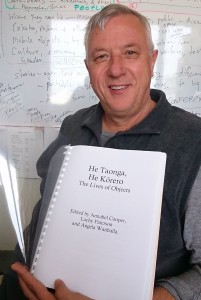
Manuscript ready for sending to Conal.
In February 2013 CROCC held its inaugural conference on “colonial objects”. This was a successful event attracting academics, librarians, archivists, heritage professionals, and others. It was always our intention to publish a collection of essays coming out of the conference presentations. The editors, Annabel Cooper, Lachy Paterson and Angela Wanhalla still have some loose ends to tie up (ably assisted by their RA, Katie Cooper) but are happy to report that our draft is almost ready. It has now been sent to Conal McCarthy at VUW to read and add a final reflective essay. Then it will be off to Otago University Press to perform their magic. Expect it in the bookshops in 2015. A big thank you to all involved.

